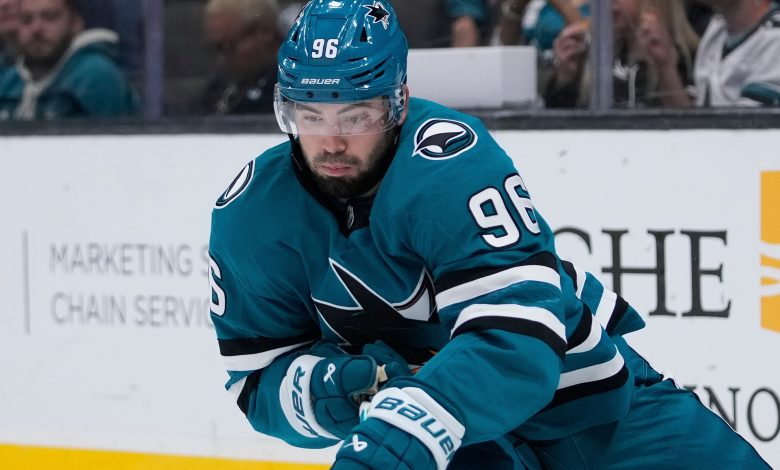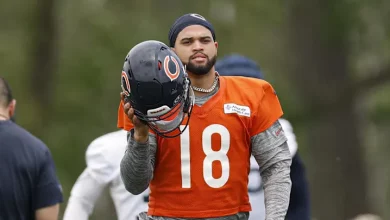Oilers Labeled a Soft Team by Head Coach Kris Knoblauch

As the Edmonton Oilers continue to fight for a playoff spot in the competitive Western Conference, their head coach Kris Knoblauch has issued a harsh critique of the team’s overall performance, labeling them a “soft” team. His comments came after a disappointing loss that saw the Oilers struggle against a physically aggressive opponent, failing to match the intensity and grit needed to secure a win.
The term “soft” carries significant weight in the world of professional sports, especially in hockey, where physicality, toughness, and a relentless work ethic are considered key ingredients for success. Knoblauch’s comments have sparked widespread discussion, with fans, players, and analysts alike debating whether the Oilers’ struggles are a result of a deeper systemic issue or just a temporary setback.
This critique of the team’s toughness comes at a crucial point in the season. The Oilers are in the middle of a tight playoff race, and their standing in the standings is far from secure. In a conference where every point counts, a lack of physicality could be the difference between a playoff berth and an early exit. For the Oilers, this challenge represents a wake-up call – a moment to reflect on their style of play and whether they have the resolve to make a legitimate playoff run.
The Soft Team Label: What Does It Mean?
When Knoblauch referred to the Oilers as a “soft” team, it wasn’t just about their physicality on the ice – it was a critique of their overall competitiveness and mental fortitude. In hockey, being “soft” can mean a variety of things:
- Lack of Physicality: A team that shies away from hitting, battling in the corners, or being difficult to play against often gets tagged as “soft.” The best teams in the NHL have defensemen and forwards who are tough to move off the puck, capable of delivering big hits and not afraid to play the gritty game when necessary. A “soft” team may avoid confrontation and struggle when faced with physical opponents.
- Inconsistent Effort: Teams that struggle to bring intensity to every shift, game in and game out, are often labeled soft. If players are seen as not putting forth a full 60-minute effort or fading when the pressure is on, it can be interpreted as a lack of toughness. A hard-working, determined team will fight for every puck, every shift, regardless of the score.
- Failure to Respond to Adversity: The best teams in hockey are able to weather adversity – be it an early deficit, a controversial call, or a rough stretch of play – and come out on top. Teams labeled “soft” often fold under pressure, failing to bounce back after a mistake or when faced with a tough opponent.
For the Oilers, this label stings. With a roster boasting some of the best offensive players in the game, including the dynamic duo of Connor McDavid and Leon Draisaitl, the team’s lack of physical presence and mental toughness has become a glaring issue that threatens to derail their playoff aspirations.
The Oilers’ Struggles: A Pattern of Softness?
Knoblauch’s comments were far from out of the blue. Throughout the season, there have been numerous instances where the Oilers’ lack of physicality and resilience was evident. In some games, the Oilers appeared unwilling or unable to match the intensity of their opponents. Whether it was failing to protect their own crease, backing down from physical confrontations, or simply not showing up for stretches of games, the Oilers have struggled with consistency.
Several key moments throughout the season have showcased the Oilers’ inability to respond to physical teams. For example, in games against the Calgary Flames and the Winnipeg Jets, the Oilers were often outmuscled along the boards and in front of the net, unable to get the puck back once they lost possession. The Oilers’ defensemen, while skilled with the puck, have struggled with physical matchups, often being overpowered in the corners or outworked by bigger, more physical forwards.
Moreover, in high-stakes games against teams like the Colorado Avalanche or the Vegas Golden Knights, Edmonton was unable to match their opponents’ level of competitiveness. In these games, the Oilers’ skill-based game was neutralized by teams that didn’t shy away from the rough stuff. This inconsistency has been a major concern for the Oilers, particularly as they approach the playoff stretch.
The Oilers’ power play, one of the most lethal in the NHL, has often been a bright spot, but their five-on-five play has been more vulnerable. Knoblauch has pointed out that a team cannot rely solely on special teams to get them through the playoffs; it’s the work in the trenches and the battles along the boards that will define the outcome of games when the intensity ratchets up.
The Challenge for Knoblauch and the Oilers
Knoblauch’s tough words represent a challenge for both himself and his players. As the head coach, he is sending a clear message to the team that their current approach will not be enough in the postseason. While the Oilers are one of the most talented offensive teams in the NHL, they must show they can compete physically, especially in tight games where skill alone won’t win the day.
Knoblauch has made it clear that the team’s focus in practice will shift toward building toughness and ensuring players are more committed to playing the gritty game. This doesn’t mean abandoning the skill-based play that has made the Oilers a top-tier team, but it means finding a balance between finesse and physicality.
To address these issues, Knoblauch is likely to call on veteran players to step up and lead by example. Players like Darnell Nurse, Zach Hyman, and Evander Kane have the ability to be physical presences on the ice, and they will need to bring that energy night in and night out. The team’s leadership group must make it clear to the rest of the roster that playing “soft” is not an option if they want to achieve their goals.
The Role of the Big Guns: McDavid and Draisaitl
As much as Knoblauch’s comments focus on the team’s overall mentality and approach, the responsibility ultimately falls on the leaders of the team – Connor McDavid and Leon Draisaitl. While both players are undoubtedly among the best in the world, they are also often seen as players who shy away from physical play.
McDavid, in particular, is known for his speed, vision, and incredible puck-handling skills. He’s the engine that drives the Oilers’ offense, and it’s understandable that his game isn’t centered around physicality. However, there are moments when McDavid’s leadership and ability to fight through adversity could be the difference-maker in a tight game or series. If McDavid can set the tone by being more assertive along the boards or sticking up for his teammates, it could inspire the rest of the team to follow suit.
Draisaitl, who has the size and strength to be more physically imposing, also needs to adopt a more aggressive mindset. While he’s known for his elite playmaking and goal-scoring ability, he has the potential to be a more dominant presence on the ice. Draisaitl’s ability to protect the puck, battle in the corners, and be more physical could elevate the Oilers’ overall play, particularly when the game gets tough.
Both McDavid and Draisaitl are capable of leading by example. If they can add a bit more grit to their games without sacrificing their offensive prowess, the Oilers will be a much tougher team to beat in the postseason.
Can the Oilers Find the Right Balance?
The question that remains is whether the Oilers can strike the right balance between skill and toughness. It’s clear that their skill players have what it takes to compete with the best in the league, but when the going gets tough in the playoffs, they will need to show they can win the battles in the corners and in front of the net.
Head coach Kris Knoblauch has set the challenge for the team to develop a more physical and resilient identity. The Oilers cannot afford to be a “soft” team, especially in the playoffs, where every game is a battle. It will require a concerted effort from the leadership group, the role players, and the skill players alike to ensure the Oilers become a team that can match physicality with finesse.
For the Oilers, the road to success in the postseason will not be solely about their power play or their dynamic offensive stars. They will need to show that they can be just as tough, just as hard-working, and just as determined as the teams they hope to beat. If they can find that balance, they could finally make a deep run that has eluded them for years.
As the season continues, the Oilers’ ability to respond to this wake-up call and embrace the challenge will be critical to their success in the postseason. With the leadership of Knoblauch and the performance of their star players, Edmonton has the potential to make the adjustments necessary to become a tougher, more resilient team as they head into the most important part of the season.









